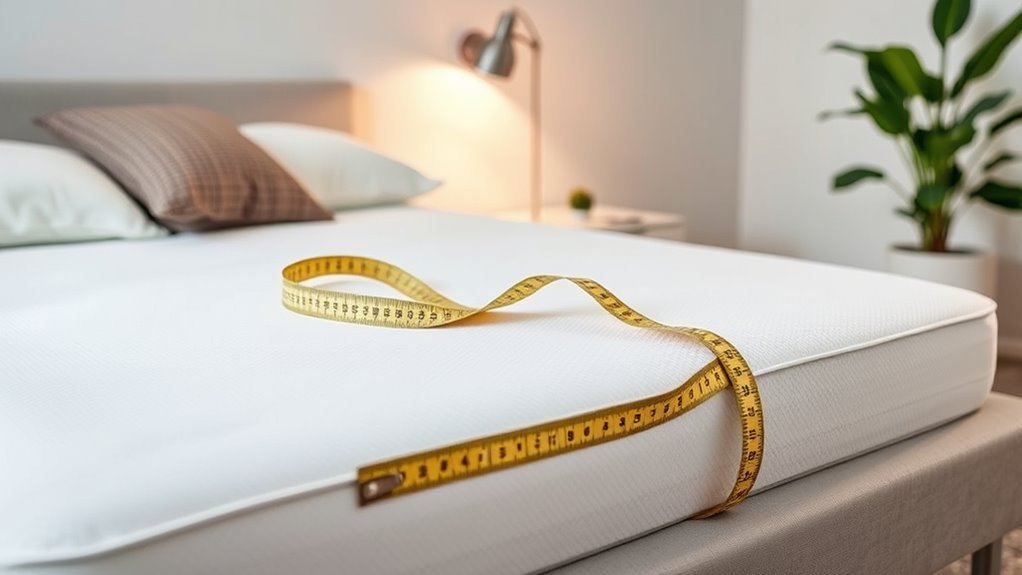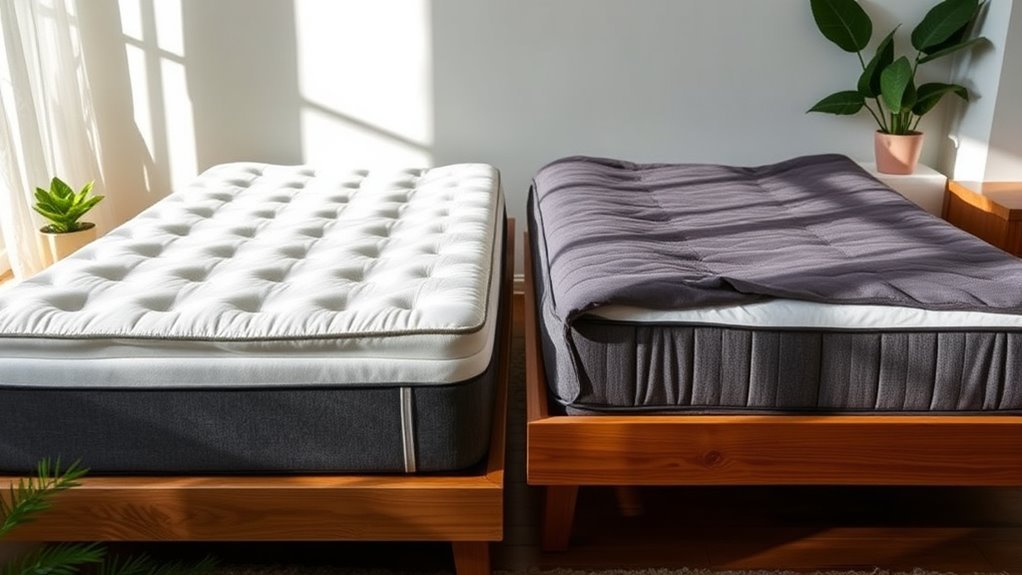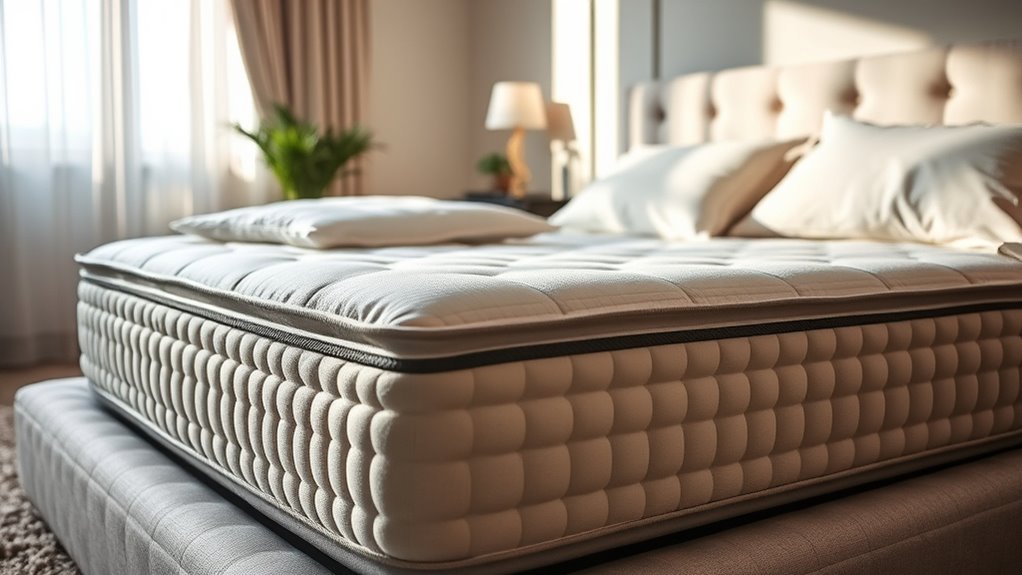To select a firm mattress for back pain support, start by considering your sleep position. Back sleepers need a firmer surface for lower back support, while side sleepers benefit from medium-firm options that cradle their shoulders and hips. Evaluate materials like memory foam for pressure relief or innerspring for durability. Look for features such as adjustable firmness and integrated lumbar support. By focusing on these aspects, you can enhance your sleep quality and address back pain—more insights await you.
Understanding Firmness Levels and Their Impact on Back Pain

When it comes to selecting a mattress, understanding firmness levels is vital, especially if you’re dealing with back pain. The firmness scale ranges from soft to extra firm, and each level affects your spine’s alignment differently. A medium-firm mattress often provides ideal support for those with back issues, as it balances comfort and firmness. This can lead to better spinal alignment and pain relief. Softer mattresses may cause your body to sink, leading to misalignment, while overly firm options can create pressure points. It’s important to find a firmness that supports your unique needs, ensuring you wake up refreshed and free from discomfort. Ultimately, a well-chosen mattress can greatly enhance your sleep quality and overall well-being.
Identifying Your Sleep Position and Its Influence on Mattress Choice

Your sleep position plays an essential role in determining the right mattress for managing back pain. Different sleep postures, such as back, side, or stomach sleeping, influence spinal alignment and comfort levels. If you’re a back sleeper, a firmer mattress can support your lower back and maintain proper spinal curvature. Side sleepers often benefit from a mattress that offers some give to accommodate the shoulders and hips while still providing overall support. Stomach sleepers may need a firmer surface to prevent excessive sinking, which could lead to misalignment. Understanding your unique sleep posture is vital for selecting a mattress that not only alleviates back pain but also promotes restful sleep, ensuring your spine remains aligned throughout the night.
The Importance of Material: Memory Foam vs. Innerspring

Choosing the right mattress material is just as important as understanding your sleep position, especially when it comes to alleviating back pain. Memory foam and innerspring mattresses each offer unique benefits.
Selecting the right mattress material is crucial for back pain relief, with memory foam and innerspring offering distinct advantages.
- Memory foam benefits: Conforms to your body, providing personalized support.
- Pressure relief: Reduces pressure points, enhancing comfort during sleep.
- Motion isolation: Minimizes disturbances from partner movement.
- Innerspring durability: Known for their long-lasting structure and support.
- Breathability: Many innerspring models offer better airflow, keeping you cool.
Ultimately, your choice should align with your specific needs. If you prefer contouring and pressure relief, memory foam is a solid option. If durability and support are your priority, an innerspring mattress might be the best fit.
Evaluating Additional Features for Enhanced Support
While selecting a mattress, it’s essential to reflect on additional features that can enhance support and overall comfort. Look for options like adjustable firmness settings, which allow you to customize the level of support based on your needs. A mattress with zoned support can also provide targeted relief, ensuring your spine stays aligned. Additionally, consider comfort features such as cooling gel layers or breathable materials, which can help regulate temperature and improve sleep quality. Some mattresses even come with integrated lumbar support, specifically designed to alleviate back pain. By evaluating these additional support and comfort features, you can create an ideal sleep environment that promotes restful nights and pain-free mornings.
Testing and Choosing the Right Mattress for Your Needs
How can you guarantee that the mattress you choose truly meets your specific needs? Start by testing various options in-store or through trial periods. Prioritize mattress durability and personal comfort to make certain it supports your back effectively. Here are some key factors to take into account:
- Firmness Level: Find a firmness that balances support and comfort.
- Material Type: Explore memory foam, innerspring, and hybrid options.
- Trial Period: Look for mattresses with a generous return policy.
- Sleep Position: Reflect on your sleeping posture for ideal support.
- Budget: Factor in your financial comfort while ensuring quality.
Frequently Asked Questions
Can a Mattress Topper Improve Firmness for Back Pain Relief?
Yes, a mattress topper can definitely improve firmness and aid in back pain relief. By choosing the right mattress materials, like memory foam or latex, you can enhance support tailored to your sleep position. If you sleep on your back, a firmer topper can help maintain spinal alignment. For side sleepers, a medium-firm option can alleviate pressure points while still offering adequate support. Ultimately, a topper can be a practical solution to enhance your comfort.
How Often Should I Replace My Mattress for Optimal Support?
Like a well-tuned instrument, your mattress needs periodic adjustments. You should replace your mattress every 7-10 years for ideal support. Pay attention to signs of mattress replacement, such as sagging, lumps, or persistent discomfort. Regular mattress maintenance tips, like rotating it every few months and using a protective cover, can extend its lifespan. Ultimately, investing in a new mattress guarantees you enjoy restful sleep and maintain your back’s health for years to come.
What Is the Ideal Mattress Lifespan for Back Pain Sufferers?
The ideal mattress lifespan for back pain sufferers is typically around 7 to 10 years, depending on mattress durability. Over time, wear and tear can compromise support and comfort, worsening back pain. It’s essential to monitor your mattress for sagging or discomfort, which can indicate it’s time for a replacement. Investing in a high-quality mattress can provide the necessary support, helping you maintain a healthy spine and alleviate discomfort during sleep.
Are There Specific Brands Known for Firm Mattresses?
Yes, there are specific brands known for their firm mattresses. Sealy products are widely recognized for their durability and support, making them a popular choice among back pain sufferers. Additionally, Saatva reviews highlight their commitment to quality and comfort, offering a range of firm options that cater to different sleep preferences. Both brands provide excellent support, ensuring you can find a mattress that suits your needs and promotes a restful night’s sleep.
Can Sleeping on a Firm Mattress Worsen Back Pain for Some People?
Yes, sleeping on a firm mattress can worsen back pain for some people. Imagine sinking into a soft cloud versus lying on a hard surface; your body’s individual preferences matter. If a firm mattress doesn’t contour to your spine, it can lead to discomfort and disrupt your sleep quality. It’s essential to find a balance that supports your back while ensuring you feel relaxed and comfortable throughout the night. Listen to your body’s signals!



